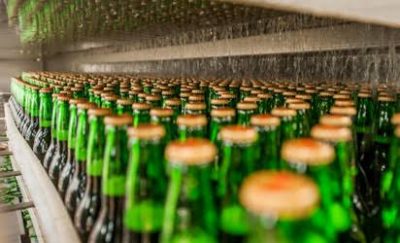Beer drinkers to pay more as brewers mull price increase this month
Beer drinkers in Africa’s most populous country will soon be paying more for their cherished bottles or cans as major players in Nigeria’s beer industry have indicated plans to increase prices this November.
Analysts in the consumer goods space told BusinessDay that they had seen the increase in prices of beer coming but it was only a question of when.
Abiola Gbemisola, research analyst at Lagos-based Chapel Hill Denham, said Nigerian Breweries in mid-October told its distributors that it would increase prices of its products by November 2019.
“And interestingly, two weeks ago I received a note from Guinness that they are also going to increase prices in same period. And then International Breweries said they were going to increase prices but they were giving their suppliers time before they implement it,” Gbemisola said.
Nigeria leads the pack of 10 biggest beer drinking countries in Africa. Beer brands make up 16 percent of alcohol consumption in the country, while other drinks (spirits and locally brewed drinks) make up 84 percent.
Consumer analysts said the price increase was expected following recent increase in excise duty.
“If you have been following the consumer space, the major players in the brewery industry over the last one year have been pressured by the increase in excise duty that the government charges on them. So it is pressuring their margins and combined with weak consumer spending,” Gbemisola said.
The Federal Government had on June 4, 2018 announced the approval of an increase to the excise duties on tobacco and alcoholic beverages to address revenue shortfalls. The increase, it said, would be introduced in phases over a three-year period (2018-2020) to moderate the impact of the increment on the price of the products. On this basis, the excise duty increased from N0.2k per cl in 2017 to N0.3k per cl in 2018, and a further increase to N0.35k per cl for 2019 and 2020.
Excise duty is a levy placed on the manufacture of locally produced goods.
In September 2019, the Nigerian government announced plans to raise Value Added Tax from 5 percent to 7.5 percent.
“With duty increases on beer as well (from N30 to N35 per litre) in June 2019, and without price increases, and given the inflation levels, the margin challenge is clear,” Guinness said in a note to companies.
In May, Nigeria Breweries said in its pre annual general meeting that it was considering an increase in price of its products across board in order to remain sustainable.
“We want to ensure our strategy to remain competitive is paying off in terms of growth, although we need to increase prices to compensate for the inflationary pressures that we are facing and probably excise duty,” Jordi Borrut Bel, CEO, Nigeria Breweries plc, said.
Eronmosele Aziba, consumer analyst at Tellimer Group, said the impact of the price increase would depend on the value of the products themselves.
“If prices of Heineken increase, it might not have a huge impact on consumers because the people that usually take it are the ones that can afford it. But if they increase prices of products that are cheaper, like Goldberg, they could suffer especially if their competitors don’t increase prices,” said Aziba.
The excise duty expense has impacted negatively on the revenues and profits of beer makers in country, their latest financial results show.
In the nine months to September 2019, Nigerian Breweries reported a further decline in earnings as profits fell by 17 percent to N12.3 billion from N14.8 billion in the previous year.
According to the company, the drop in profits was driven by the new excise duty rate that came into effect on June 4, 2018. It paid N24.2 billion in excise duty in the nine months to September.
Also, Guinness said that a challenging macroeconomic environment, coupled with competition, unfavourable mix performance and excise duty increases on both beer and mainstream spirits negatively impacted its first-quarter results ending in September.
The revenue for the drinks company fell by 4 percent to N26.9 billion from N28 billion in the same period in 2018, and operating profit declined by 59 percent to N682 million, from N1.67 billion, driven by the drop in revenue.
Commenting on the results, the company noted that “these top line performance factors, and especially the excise duty increases, impacted our gross profit”.
Ayorinde Akinloye, a consumer analyst at CSL Stockbrokers, however, thinks the brewers may have decided to implement the beer price increase in the fourth quarter of the year because of the approaching festive period.
But despite the challenges, makers of beer are still making entry into Africa’s largest market with an average population of 21 years. Africa is the fastest growing region for beer consumption, according to a report by market research group, Global Data. (BusinessDayOnline)


